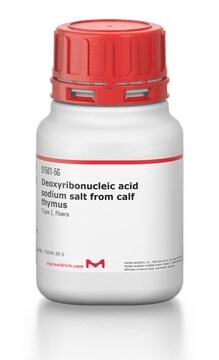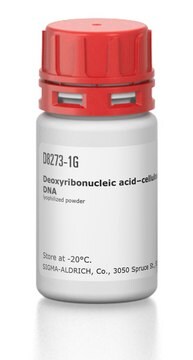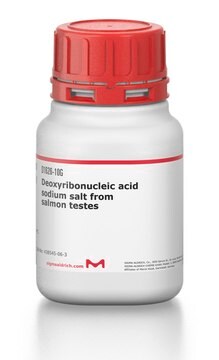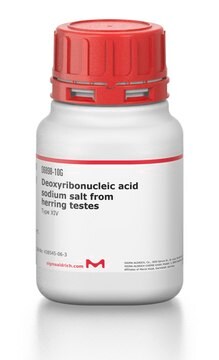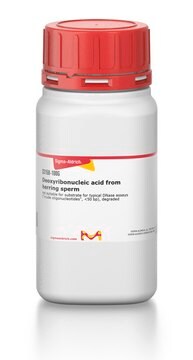D8515
Deoxyribonucleic acid−cellulose double-stranded from calf thymus DNA
lyophilized powder
Synonym(s):
DNA, Deoxyribonucleic acid, ds-DNA-Cellulose, DNA-Cellulose
Sign Into View Organizational & Contract Pricing
All Photos(3)
About This Item
Recommended Products
form
lyophilized powder
Quality Level
extent of labeling
3-8 mg double-stranded calf thymus DNA/g
storage temp.
−20°C
General description
Deoxyribonucleic acid−cellulose double-stranded from calf thymus DNA, also known as ctDNA is a natural source of DNA designed for DNA binding agent studies. The detection limits of ctDNA are around 2.0ng and the linear ranges of light scattering intensity (I(LS)) is 0.05-1.5 mµg.
Application
Deoxyribonucleic acid−cellulose double-stranded from calf thymus DNA is used to study the binding parameters and binding specificity of a variety of proteins, nucleotides, and chemical reagents including anti-cancer agents. It is frequently used in pull-down assays and chromatographic procedures.
Quality
May contain a trace of Tris and EDTA.
Storage Class Code
11 - Combustible Solids
WGK
WGK 3
Flash Point(F)
Not applicable
Flash Point(C)
Not applicable
Personal Protective Equipment
dust mask type N95 (US), Eyeshields, Gloves
Choose from one of the most recent versions:
Already Own This Product?
Find documentation for the products that you have recently purchased in the Document Library.
Customers Also Viewed
Yi Zhou et al.
Journal of immunology (Baltimore, Md. : 1950), 198(7), 2568-2577 (2017-02-22)
CD74 mediates MHC class-II antigenic peptide loading and presentation and plays an important role in the pathogenesis of autoimmune diseases, including systemic lupus erythematosus. C57BL/6
Lutz Wobbe et al.
Nucleic acids research, 41(13), 6553-6567 (2013-05-08)
The molecular function of mTERFs (mitochondrial transcription termination factors) has so far only been described for metazoan members of the protein family and in animals they control mitochondrial replication, transcription and translation. Cells of photosynthetic eukaryotes harbour chloroplasts and mitochondria
S S Zhang et al.
The Journal of biological chemistry, 266(30), 20483-20490 (1991-10-25)
Two DNA helicases from calf thymus nuclei have been purified and characterized. The two proteins, designated as nuclear DNA helicase I and II, were copurified on Bio-Rex 70, DEAE-Sepharose, phosphocellulose and subsequently separated from each other on a heparin-Sepharose column.
A Georgaki et al.
Nucleic acids research, 22(7), 1128-1134 (1994-04-11)
A DNA helicase from calf thymus, called DNA helicase F, copurified with replication protein A through several steps of purification including DEAE-Sephacel, hydroxyapatite and single stranded DNA cellulose. It is finally separated from replication protein A on FPLC Mono Q
T Kuzuhara et al.
Biochemical and biophysical research communications, 362(4), 805-810 (2007-09-04)
Tumor necrosis factor-alpha (TNF-alpha) inducing protein (Tipalpha) is a carcinogenic factor secreted from Helicobacter pylori (H. pylori), mediated through both enhanced expression of TNF-alpha and chemokine genes and activation of nuclear factor-kappaB. Since Tipalpha enters gastric cancer cells, the Tipalpha
Our team of scientists has experience in all areas of research including Life Science, Material Science, Chemical Synthesis, Chromatography, Analytical and many others.
Contact Technical Service